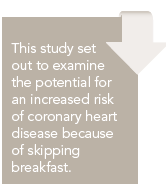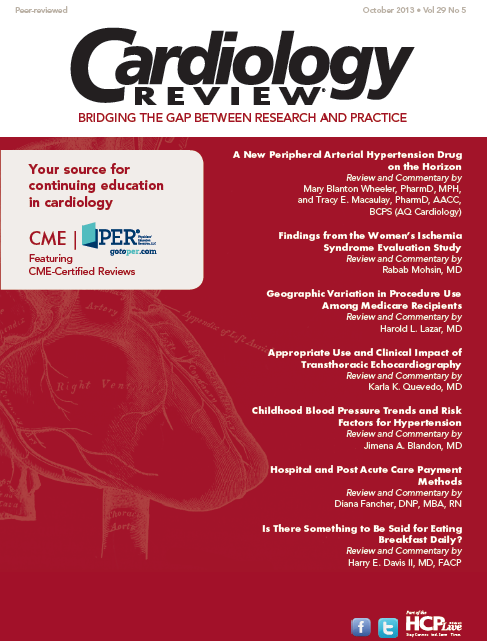Publication
Article
Cardiology Review® Online
Is There Something to Be Said for Eating Breakfast Daily?
Author(s):
A study examines the potential for an increased risk of coronary heart disease because of skipping breakfast.

Harry E. Davis II , MD, FACP
Review

Cahill LE, Chiuve SE, Mekary RA, et al. Prospective study of breakfast eating and incident coronary heart disease in a cohort of male US health professionals. Circulation. 2013;128:337-343.
The contribution of personal habits such as eating, drinking, smoking, and exercise to health status and long-term survival form a key component of disease prevention. However, it is very difficult to prove that specific preventive efforts actually improve a person’s health. We can assume that lifelong efforts to maintain a healthy diet, exercise regularly, or avoid smoking will contribute to preventing coronary heart disease. But, to paraphrase Harvey Fineberg, MD, PhD, President of the Institute of Medicine, success in disease prevention is invisible,1 and the need for evidence-based recommendations to support preventive efforts is appreciated.
Cahill et al have attempted to provide some of this evidence.2 They have examined the dietary habits in a large cohort of males that included dentists, veterinarians, pharmacists, optometrists, osteopaths, and podiatrists. As part of the ongoing prospective study of 51,529 male health professionals in the Health Professionals Follow-up Study (HPFS), they followed a cohort of these professionals from 1992 until January 31, 2008, using mailed biennial questionnaires that addressed medical history, lifestyle, and health-related behaviors. After excluding men who had died before the start of this collection period, those with extremes of caloric intake (total energy intake outside the range of 800 cal/d to 4,200 cal/d), and individuals with known cancer, coronary heart disease (CHD), myocardial infarction, angina, or stroke, they examined the responses to these serial questionnaires in a final sample size of 26,902 men.
Through a series of statistical analyses they found significant differences, primarily with regard to eating breakfast and eating late at night. Breakfast was defined as any of 3 eating times (before breakfast, breakfast, and between breakfast and lunch). Men who skipped breakfast had a 33% higher age-adjusted risk of CHD, were younger, and were more likely to be smokers, unmarried, less physically active, and to drink more alcohol. The late-night eaters (defined as eating after going to bed) had a 55% higher risk of CHD and were more likely to smoke, to sleep less than 7 hours a night, or to have baseline hypertension. On the other hand, men who ate breakfast were more likely to be nonsmokers, to be married, to be more physically active, and less likely to work full-time (71% worked full-time vs 77% for the non-breakfast eaters).
Overall diet quality was assessed using a calculated diet score based on the 2010 Alternate Eating Index,3 which has been shown to predict the risk of chronic disease. The authors concluded “Eating breakfast was associated with significantly lower CHD risk in this cohort of male health professionals.” They indicated they had not found evidence of any prior such studies and concluded they were the first to conduct a prospective analysis of eating habits and the risk of CHD. Accordingly, they recognized the need for replication “in women and other ethno-cultural groups” but, if confirmed, a recommendation for daily breakfast eating would be warranted.
CommentaryJustifying a Recommendation to Eat Breakfast
Cahill et al provide a prospective analysis of eating habits and their possible relation to CHD. Their findings, based on data gathered over a 16-year period, suggest that eating breakfast was associated with a lowered risk of CHD—possibly the result of its effect on the prevalence of obesity, hypertension, hypercholesterolemia, and type 2 diabetes mellitus. Their data came from a very specific population of largely (97%) white males of European descent. Based on their analysis of this data, they suggest that a recommendation for daily breakfast eating by clinicians and health authorities will be justified if this finding is confirmed in other populations.
The idea that diet may be an important factor affecting health and well-being is not new. In 1965, the Human Population Laboratory of the California State Department of Health Services in Berkeley, California, initiated a study of common health practices and their potential for a positive effect on health.4 Later referred to as the “Alameda 7,” they found 7 health habits to be associated with physical health status and mortality. These habits were: having never smoked, drinking less than 2 drinks at one sitting, sleeping 7 to 8 hours a night, exercising, maintaining a desirable weight, avoiding snacks, and eating breakfast regularly. On follow-up studies at 5½ years,5 9 years,6 and 17 years,7 these habits continued to be significant. An increased risk of death was associated with being male, smoking, having little physical activity, being over- or underweight, and not regularly eating breakfast. Interestingly, this study was also limited in demographic characteristics (only whites and blacks were included).7
Cahill et al also lament the current lack of recommendations about frequency or time of meals in the Dietary Guidelines for Americans, 2010.8 As they point out, the 2010 Guidelines indicated that “Not eating breakfast has been associated with excess body weight,” especially among children and adolescents. Further, the United States Department of Agriculture guidelines have tended to provide recommendations for types and amounts of food rather than patterns of eating.8
This study has again confirmed the likelihood that dietary patterns, especially with regard to the potential for positive health effects of eating breakfast, are very likely important. While it is desirable to have confirmation of this finding in populations with other demographic characteristics, it is reasonable to conclude that clinicians can now recommend to their patients eating breakfast every day, both to improve health and potentially reduce mortality risks.
References
1. Fineberg HV. The paradox of disease prevention; celebrated in principle, resisted in practice. JAMA. 2013;310:85-90.
2. Cahill LE, Chiuve SE, Mekary RA, et al. Prospective study of breakfast eating and incident coronary heart disease in a cohort of male US health professionals. Circulation. 2013;128:337-343.
3. Chiuve SE, Fung TT, Rimm EB, et al. Alternative dietary indices both strongly predict risk of chronic disease. J Nutr. 2012;142:1009-1018. 4. Belloc NB, Breslow L. Relationship of physical health status and health practices. Prev Med. 1972;1:409-421.
5. Belloc NB. Relationships of health practices and mortality. Prev Med. 1973;2:67-81.
6. Wiley JA, Camacho TC. Life-style and future health: evidence from the Alameda County Study. Prev Med. 1980;9:1-21.
7. Kaplan GA, Seeman TE, et al. Mortality among the elderly in the Alameda County Study: behavioral and demographic risk factors. Am J Public Health. 1987;77:307-312.
8. US Department of Agriculture and US Department of Health and Human Services. Dietary Guidelines for Americans, 2010. 7th ed. Washington, DC: US Government Printing Office; December 2010.
About the Author
Harry E. Davis II, MD, FACP, is Associate Professor of Medicine and Vice Chair for Education in the Department of Internal Medicine, Texas Tech University Medical Sciences Center, El Paso, TX. Dr. Davis received his medical degree from West Virginia University in Morgantown, WV, and did his internal medicine residency at Philadelphia General Hospital in Philadelphia, PA, and Letterman Army Medical Center in San Francisco, CA. He has practiced medicine with the US Army in many capacities, including Chief of Emergency Medicine in Fort Lewis, WA, Division Surgeon in the 1st Infantry Division, Fort Riley, KS, and as Commander of the Field Hospital/ Chief Medical Officer with the UN Forces in Port-au-Prince, Haiti. Dr. Davis has received numerous honors and awards for service and teaching.






